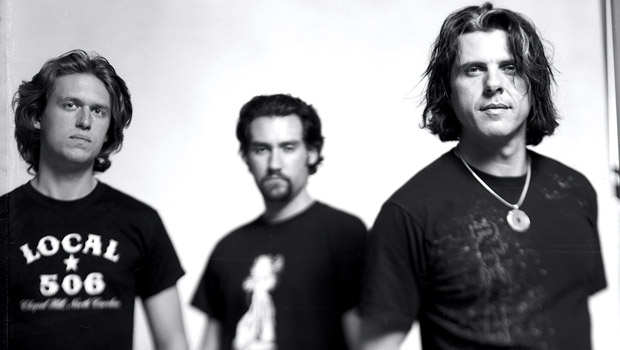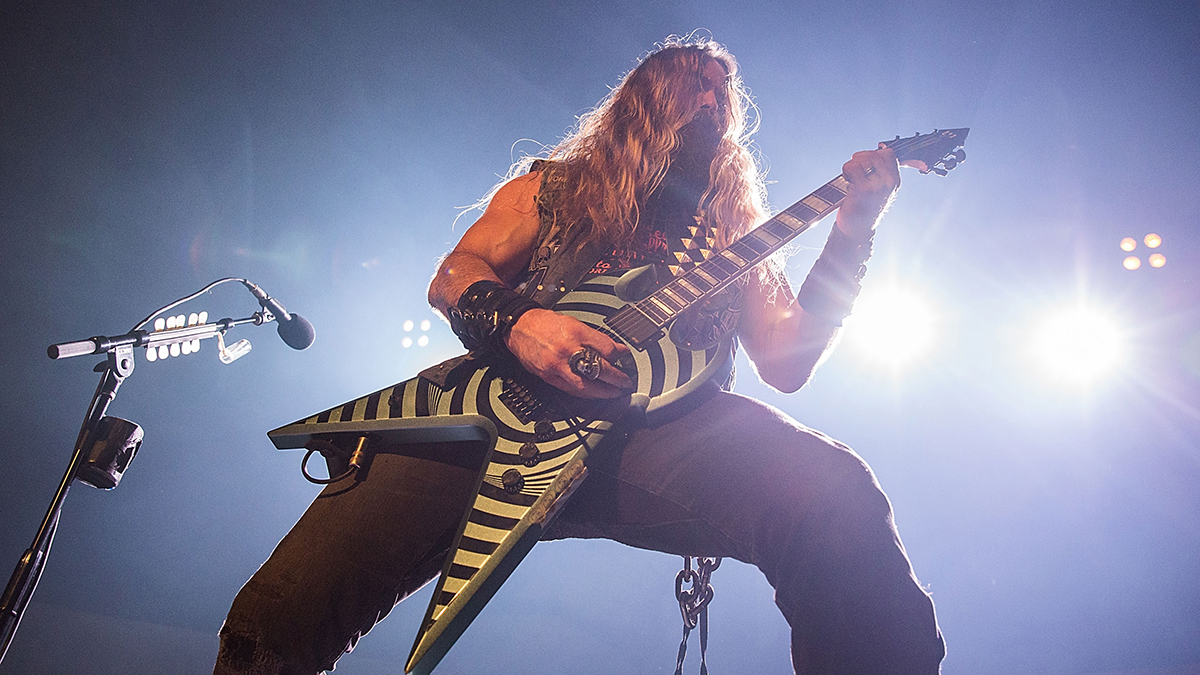Interview: Alex Skolnick Discusses Playing with Ozzy and His Journey As a Crossover Jazz Guitarist
All the latest guitar news, interviews, lessons, reviews, deals and more, direct to your inbox!
You are now subscribed
Your newsletter sign-up was successful

Alex Skolnick is one busy guitarist. He's been touring relentlessly, promoting his latest Alex Skolnick Trio album, Veritas, and co-headlining a Testament tour with Anthrax and Death Angel.
On January 20 at the 2012 Winter NAMM show in Anaheim, California, Skolnick and Testament headlined the Dean Guitars NAMM Jam. He even hosted a guitar camp, the Winter Guitar Retreat, with Megadeth's Chris Broderick over the holidays.
Despite all this activity, I was able to grab a few minutes with Skolnick to talk all things guitar-related and to pitch him a few questions from readers.
GUITAR WORLD: Who were your musical heroes when you were growing up, and what has it been like to meet and/or play with several of them?
It started with Kiss, and later Randy Rhoads and Eddie Van Halen. I was a little disappointed when I finally got to meet Kiss because I had gotten into them during the Alive period. When I finally met them, they had songs like “Crazy Nights," stuff I wasn't really crazy about. I also was a fan of groups like Judas Priest and Iron Maiden, and getting to meet those guys was incredible. And, of course, there's Black Sabbath; being on a first-name basis with Geezer Butler and Tony Iommi was just great. Every time I've been on a bill with them, they say, “Hello, Alex." I never got to meet Randy Rhoads, but I did play one show with Ozzy when he was looking for guitar players in the '90s, so that was exciting.
Exactly how did that come about?
It was really cool. It was one of these periods where Ozzy and Zakk Wylde had temporarily parted ways. He tried out a few different people, and I think I was the only one who made it as far as doing an unannounced show with him in England, and he told me I was hired. But I later found out from Sharon Osbourne that they had also been looking at another guy, Joe Holmes, who ended up doing the tour. Then they brought Zakk back. It was a very confusing time, but it actually worked out great because I got to do the show and I was just starting to study jazz seriously, so it definitely would've gotten in the way. I can't imagine not getting into jazz the way I did, so actually it worked out really well.
All the latest guitar news, interviews, lessons, reviews, deals and more, direct to your inbox!
I've got a few reader questions here for you. Chris in Boston wants to know about your time studying jazz. Did you study at the Juilliard School?
I never studied at Juilliard. I did study at New School University, which is one of New York's major universities. It often gets overshadowed by Columbia and NYU, but they happen to have a great jazz program — probably the best jazz program in New York, if not the country. I think that, as with any music program — and I have a lot of friends who have gone to schools like Juilliard, for example, where it's a cookie-cutter mentality. It's almost a factory. You have to be very individually motivated, but it's possible to take what you learn there and turn it into something great and just make the best of it. But you can get lost in the curriculum.
In my case, studying with incredible musicians like George Garzone, Vic Juris and Reggie Workman really just increased everything I had as a player and helped me develop it into something new. I needed a few years where I really was just a jazz guy. I needed to go through that just to give it that shot. I never put down other types of music; I just needed to not play them for a while in order to focus on jazz. Because it wasn't the music I had been playing from the time I was very young, and out of respect for the music, I felt I needed that. Once I put in that time, I felt like it was OK to start branching out and revisit metal and other styles.
How have you been accepted by the jazz community?
Much better than I expected, actually. I was expecting to be publicly flogged. Most of the people I came in contact with were actually flattered because, you know, where I was receiving so much attention and I could just coast comfortably as part of this one genre, I did something very challenging and learned some of the most challenging music there is. It's like speaking another language, and people who spoke that language respected the fact that I respected their language.
I didn't think I could just come in and do it instantly; that's why I went to school. It took so long before I did my first jazz record, and then when I did, I thought I would have to do several before I got any sort of mainstream jazz press. But publications like Downbeat and Jazziz Magazine were covering me. That was the last thing I expected. I felt honored. I'm probably the only person who's ever gone on tour supporting Slayer who's been in Downbeat.
Who are your favorite jazz players? Are there any new ones we should know about?
I started getting into the guys who were sort of crossover players who had rock bands as well. Like Pat Metheny, but who also has a strong jazz vocabulary like John Scofield. More recently, I’ve gotten into someone who is a big influence on them, John Abercrombie, who somehow I'd missed. Wes Montgomery is obviously the godfather of jazz guitar — and Jim Hall, who is just a wonderful player. Bill Frisell is someone whose music I don't study, I just listen to it. But I'm sure I absorb a lot of what he does just by listening.
As far as newer players, there's a guy named Adam Rogers who's probably one of the best. He’s played with everybody from Michael Brecker to John Patitucci. I have bootlegs of Patitucci recording with him, and they’re amazing. There is a younger guy, Jonathan Kreisberg, who is coming up, and I know he started out as more of a hard-rock, progressive player. Now he's one of the more respected straight-ahead jazz players. There's another young guy named Mike Moreno, who I ran into when I was studying at school. He had been a metal head as well. He had actually seen me open for Slayer. He's played with people like Nicholas Payton, Robert Glasper and for all these very straight-ahead jazz players. So it's kind of this whole other world you don't read about in guitar magazines. Also Jim Campilongo and Adam Levy. Great players.
What about Rodrigo y Gabriella? What was it like jamming with them?
That was just an incredible surprise that came out of nowhere. We ended up having this great partnership and collaboration. I played on their last record, 11:11. We did a lot of shows, too. They really helped bring a lot of attention to my trio. We played everywhere from the Olympia in Paris to Radio City Music Hall. I supported them with my trio and then jumped on stage and played with them. They’re incredible musicians and performers, and they really bring something different to music. They’re helping remind people how exciting live music is — and they don't even have drums or anything. Gabriella is basically the drummer on the guitar.
Mike wants to know what's up with the band Acrassicauda.
I'm very proud to have produced their first professional recording, which is available in stores and on their website. They recently did their first tour. They understand that now the challenge begins. They got out of Iraq, they won’t have to worry about bombs and sniper fire anymore, but now the challenge is being in a band and working your way up through the music industry, which isn't easy. They are preparing another recording. I'm so busy now with so many projects that I am probably not going to have time to work on their next recording, but it looks like they're going to be in very good hands. I can't say with who yet, but I am very proud to have helped them get there and I see good things for them.
What guitarists and musicians have you learned the most from simply through jamming and hanging out with them?
That's a good question. Bassist Michael Manring is someone I've learned a lot from. He’s this really quiet, unassuming person who is absolutely phenomenal. He creates incredible music. There's another guy named Jimmy Herring who is a great player, who is sort of more known in the jam-band circle. But he’s actually a phenomenal jazz-oriented player. And again he's somebody who just loves music and puts his heart into it and can step into any situation and make it work. You can put Jimmy Herring on stage with B.B. King, Chick Corea or Herbie Hancock, and he'd be able to play great.
Kelly in New York wanted me to ask about your Bollywood connection.
My trio has this album called Veritas, and the opening track is “Bollywood Jam." It's sort of the continuation of something we started on our previous album, Last Day In Paradise, which closed with a song called “Western Sabbath Song.” It was just a quirky piece where we took the mood of a Western movie and combined it with the influence of Black Sabbath and somehow made it jazz improvisation. On “Bollywood Jam,” we did the same thing, the mood of music from a Bollywood film. And it was sort of inspired by the composer for Slum Dog Millionaire, A.R. Rahman. We took that and turned it into improvisation.
It's also inspired by musicians who have incorporated Indian music into their stuff, such as John McLaughlin. But it's one of our favorite tunes to play live and we made a video for it where we brought in belly dancers and sort of recreated the Run DMC/Aerosmith “Walk this Way” video. I know belly dancers aren't all authentically Bollywood dancers, but it just seemed to work really well, and it fit the mood of the song.
